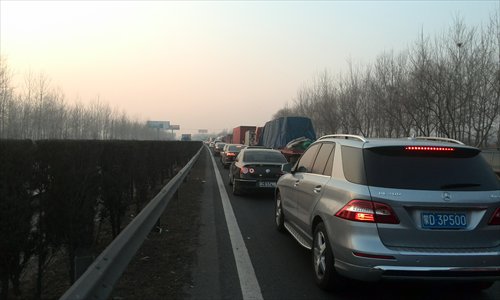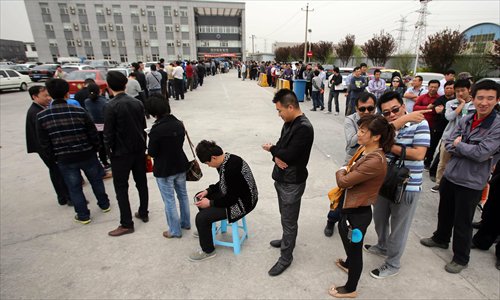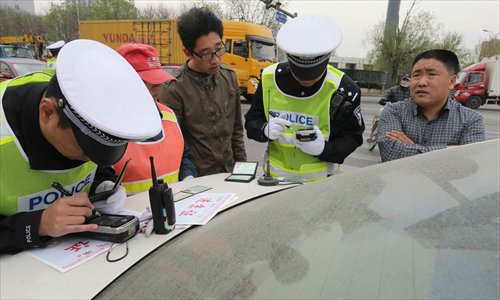Car lottery calamity
New regulations on temporary permit holders put thousands under strain

In April, the Beijing Traffic Management Bureau changed regulations affecting temporary registration permits, in the hopes of reducing congestion on the city's overburdened roads. Photo: CFP
Once every 12 days, Wei Guohua makes a pilgrimage from his home in Changping district to a checkpoint 150 kilometers away in Xiji. The purpose of this pilgrimage is to obtain a temporary registration permit for his car, which will allow him to drive in Beijing for another 12 days. Then he will have to make the journey again, rinse and repeat, ad nauseum.
"Sometimes, we deliberately arrive after midnight, to give us an 'extra' day on the permit," said Wei, who works in the microelectronics industry.
Wei sometimes drives himself, and sometimes carpools with others who find themselves in the same situation to save a little money. In total, the journey takes around three hours, not including filling out forms and queuing in line. No matter how late it is when Wei finally arrives home, he will have to get up early the next morning to drive his 8-year-old daughter to school.
Wei is just one among thousands of Beijing residents in the same situation. Without a permanent registration plate permitting them to drive their cars in Beijing, they must make a pilgrimage every 12 days.
A total lottery
In order to deal with the burgeoning traffic congestion problem in Beijing, the municipal government adopted a quota system three years ago to restrict the rampant growth of new car owners.
The quota system limits the number of Beijing license plates that can be issued each month. Without a registered Beijing license plate number, one cannot drive their car in Beijing.
Those who are travelling to Beijing, but have a license plate number from any of China's other municipalities, must apply for a temporary registration permit.
Because the number of people who wish to obtain a permanent Beijing license plate far exceeds the number of license plates that can be issued under the quota, a lottery system was implemented to randomly determine who would be granted a license plate, and who would miss out.
According to a Beijing Youth Daily report, 2.8 million people entered the license plate lottery this July, each with just a meager 0.7 percent chance of actually getting one.
Until recently, those who missed out on "winning" a plate in the lottery were able to exploit a loophole in the temporary registration permit regulations.
Car owners could obtain an out-of-town license plate number, and then apply for a "long-term" registration permit that would allow them to drive their car in Beijing for six months. When it expired, they could apply for another six-month permit. But in April of this year, the Beijing Traffic Management Bureau did away with "long-term" registration permits. Now, the longest continuous period one can hold a temporary registration permit for is just 12 days.
It is estimated that at any one moment in Beijing, there are between 300,000 and 500,000 cars driving with temporary registration permits.

People queue up outside a checkpoint center that issues the permits. Photo: CFP
Caught in traffic
Wei has been living in Beijing for 14 years, and holds a Beijing hukou (household registration), which is one of the prerequisites for entering the license plate lottery. He has entered the lottery every month since 2011, but has had no luck thus far.
By August 2012, Wei felt as if he could not wait any longer, and bought a car despite not having a Beijing license plate number.
Wei was well aware of the restrictions imposed on those driving on an out-of-town registration number in Beijing: he would not be allowed to drive within the Fifth Ring Road during weekday rush hours (7 am to 9 am, and 5 pm to 8 pm), and he would have to renew his temporary permit every six months.
Under the new regulations, the rush hour no-go zone has been extended to the Sixth Ring Road.
The regulations are strictly enforced through a network of traffic cameras around the city. Those caught will be required to pay a 100-yuan ($16) fine, as well as having three points deducted from their driver's license. If vehicle owner has all 12 points deducted, they will be disqualified from driving, and their driver's license revoked.
The restrictions have inevitably lead to problems for Wei.
"Sometimes, in emergencies, you have to drive even if you'll be punished," said Wei.
On one occasion, Wei's wife had taken their daughter to a hospital in downtown Beijing. Because of traffic delays, mother and daughter were caught inside the Fifth Ring Road during the evening rush hour.
"She called me on the highway, and asked me whether they should stop and wait until after 8 pm," said Wei. "But how could she, given that she was with a child who had not eaten? So I just told her to take a detour through the smaller roads, where there are fewer traffic cameras."
Greasing the wheels
"Getting a temporary permit takes up one whole day each week - five to six hours travelling to the checkpoint - and then two hours waiting in line," said Liu Feng, a 29-year-old IT manager who is in the same boat as Wei.
A keen amateur photographer and outdoor adventurer, Liu bought a car after two years of failure in the lottery. His license plate is registered in Inner Mongolia Autonomous Region.
"Accounting for fuel and road tolls, each trip costs around 120 yuan. In other words, I spend 52 days and more than 6,000 yuan each year on getting temporary registration permits," said Liu.
To alleviate this burden, car owners who rely on temporary registration permits to drive in Beijing have devised a number of ploys, said Wei. In addition to sellers on Taobao, who for a sum of around 100 yuan will acquire a permit for you, there are groups on messaging platform QQ to arrange carpools to checkpoints, as well as chartered buses.
There are also ways of improving one's chances in the license plate lottery, Wei added, such as asking friends with no intention of owning a car to enter the lottery on one's behalf. But so far, Wei has refrained from going down this route, saying that he wouldn't feel comfortable with the arrangement. If one of his friends did manage to "win" the lottery, the plate would still not be registered under Wei's own name, and he would have no legal protections if his friend wanted it back.

Traffic officers check temporary registration permits. Photo: CFP
Common grievances
Many affected by the changes to regulations introduced in April believe the restrictions to be ineffective and hypocritical.
"This doesn't help ease traffic congestion or harm to the environment at all," said Wang Qiushi, a lawyer residing in Beijing.
Until the recent rule change, Wang drove a car with a Shanxi license plate, but he now drives a friend's vehicle that has a Beijing registration number.
"[Because of the regulation changes], hundreds of thousands of cars have to be driven out of town and back each week. This results in unnecessary carbon emissions, as well as making congestion worse on roads entering and exiting Beijing," said Wang.
Wei echoes Wang's thoughts.
"Isn't this making the pollution worse? It's a sheer waste of energy and money," he said.
Liu added that despite the added hassle caused by the regulation change, the number of cars on the road "show absolutely no sign of decreasing."
Wang believes the regulations amount to "regional discrimination," and has begun taking steps to change the quota system through legal means.
Lobbying for change
Wang has drafted an application petitioning the municipal government to change the regulation which differentiates between license plates from different regions.
He said that more than 700 people had signed the petition, and he had submitted it to the Legislative Affairs Office of the State Council awaiting response.
"I was drumming up support to draw more attention to the issue, but someone from the Beijing Traffic Management Bureau warned me to stop," said Wang.
Zhang Zhuting, a professor at the Transport Management Institute, said that he currently sees no alternatives.
Zhang noted that the quota system and restrictions on temporary permit holders were only one part of a broader strategy to combat traffic congestion and control carbon emissions. Positive measures are also being taken, said Zhu, such as the ongoing development of a comprehensive public transportation system that will make it less necessary to own a car.
"The very point of the restrictions is to inconvenience car owners who do not have local license plates, so there will be less cars on the road," Zhu said.
But the regulations have gone further than that, said Wei.
Newspaper headline: New regulations on temporary permit holders put thousands under strain